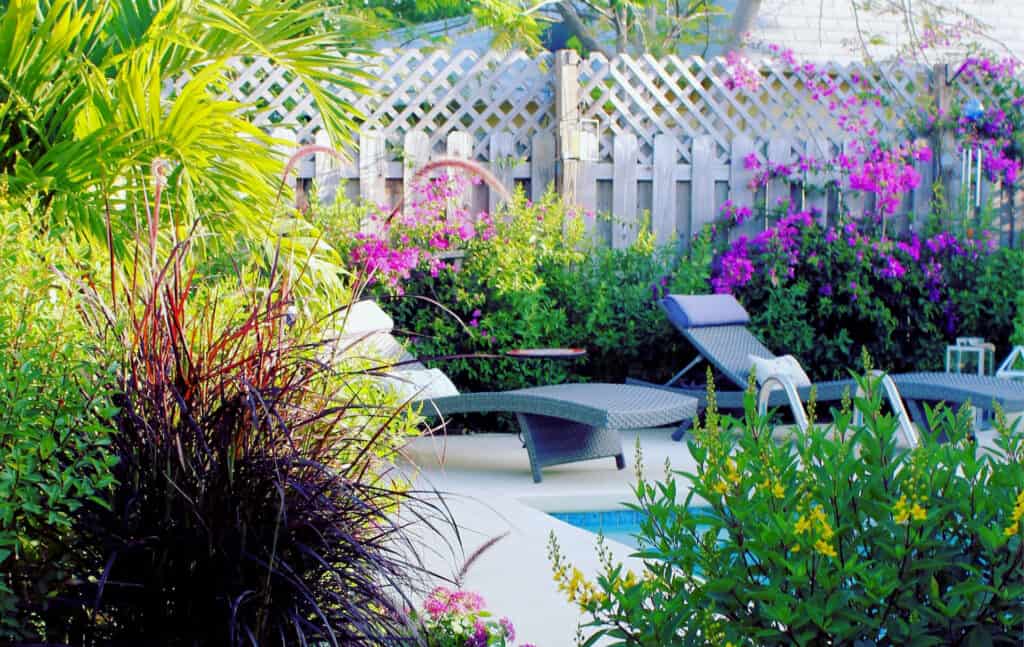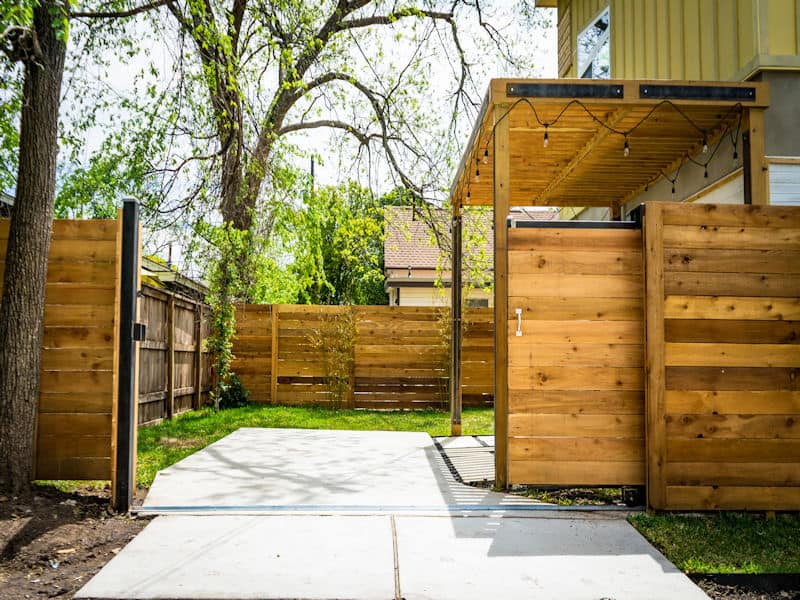
A fenced-in backyard is a terrific idea if you are looking to gain some privacy, aesthetic appeal, a safe place for the kids to play or dogs to run free off the leash, and, let’s not forget the added security between your home and the ever-changing streets. A tasteful fence can also add quite a bit to your home’s curb appeal and thus, to the value of your home.
These are a few of the more obvious things to be considered. But, before moving ahead, there are a few key aspects to consider. From style selection, general landscaping decisions and planning as well as the ever important pricing and municipal speedbumps that can arise, just to name a few. Fear not, however, for I have recently done a great deal of the research on this subject in order to enhance my own backyard. The key questions you will need to answer for yourself will certainly include the following…
What Is The Purpose Of My New Fence?
Apart from the reasons named above, the answer to this question is of the utmost importance as a fence can be either a big investment in money and, if you are a DIY guy like me, time as well. I would recommend that you take some time to read over this entire post and then think it over. A big investment should have a big reason why.
Determining Your Budget:
For some of you, this may seem like putting the cart before the horse. I have begun projects like this based on my whimsy and have found, invariably, that I had always spent more money than the project was worth to me. To do so allows others to set your budget for you. This is never a good idea. Figure out what you would be able to afford first, then look at your fencing options. These will include the following:
The Type of Fence You’d Prefer:
Fences come in many different materials, styles, sizes, and even colors. These range from various woods, vinyl, aluminum, and good old-fashioned wrought iron. With your fence’s purpose in mind, you can best identify all the pros and cons of any fencing style as they suit your vision. For example, the privacy you’d like for your children’s play area or perhaps you’re looking at a private garden like that of Mr. Miyagi might require a taller stockade-style fence rather than that of aluminum that is wide open to anyone walking by and that won’t contain your dog.
Fence Maintenance:
There are considerations when it comes to climate and things of this nature. In a subtropical climate of say, Southern Florida, a wooden fence will require more maintenance over time whereas aluminum and/or vinyl might eliminate most maintenance.

Do you have HOA considerations:
Homeowner’s Associations often have strict requirements regarding some to all aspects of fencing to be installed, more often than not for good reason. Aesthetics are usually their biggest concern. I would recommend that you look into the by-laws and agreements you likely had to sign before buying your property. You may need to submit a formal request to your board and have a hearing over your request to get the permissions you need.
Most towns will also have zoning issues that will have to be considered. Things like distance from the curb, which way the fence is to face, and to limit how tall a fence can be. Once again, there is some investigation to be done and perhaps permits from your town’s building department to acquire. Not doing so can cost a great deal in fines imposed. In the end, it’s likely a few phone calls and online forms that have to be filled out. Worst case, you may have to apply for a variance to the existing building codes in your town. I have done this myself and can say that it sounds more difficult than it is.
You will likely need a current survey:
All towns will require a survey. Most towns will accept a survey that is within 3 years of your request for a permit. You will have to check this out on your own as these will vary from town-to-town. If you were to need a survey done, it will typically cost between $200 and $500. I found a website during my research for this post that may be of help with judging the cost of having a survey done.
By the way: If you were to decide to put up a fence on your own without a permit, the town will very likely have the power to force you to take it down if there are complaints made against its installation.
In any case, it’s always a good idea, regardless of whether you are getting a fence or not, to know where your property lines are definitive. To do so can avoid discomfort between neighbors. Maybe that’s where the adage “good fences make for good neighbors” came from.

Consideration of Your Neighbors
While there is nothing written in stone about this, acquiring your neighbor’s blessing on a project of this nature is widely considered to be “good form”. To do so not only gives you peace of mind but also shows respect to your immediate neighbor and the rest of the neighbors at large. If you have difficult next-door neighbors, the road will be a bit bumpier when it comes to permits and the like. But, in the end, still doable.
On the other hand, if the intended fence is found to be beneficial to both your and your neighbor’s interests, you might be able to work out an agreement where the expense might be split between you. This could be complicated if your tastes are not the same but, it can be done with some compromises.
Landscaping Considerations:
As mentioned earlier, it is a good idea to plan when it comes to landscaping your backyard. The design and cost concerns of plants, trees, shrubs, pathways, accessories, etc. are things that should be worked out in minute detail before starting your fencing project. Otherwise, your results, while improved, could be somewhat disappointing and perhaps more expensive than you may have thought.
DIY or Hire a Professional:
I am an avid DIY person. I don’t ever too easily purchase things that don’t, in time, pay for themselves, even if the value of a thing is less quantifiable like personal enjoyment. In this case, I hired out as I was not likely to find help with what I’m sure was to be an arduous and tedious job; lots of toting, digging leveling, vertical plumbing of posts in cement, and whatnot.
The contractor I hired helped me through the different styles that would serve my purpose and was able to send me to drive-by homes that he had worked on.
Key Points When Hiring a Pro :
- A good contractor’s expertise will lend credibility to his knowledge of the materials necessary and their upkeep over time
- An experienced contractor will have the knowledge and likely ability to stay within the town’s regulations with the installation itself allowing for a certain peace of mind.
- Be certain to see that your contractor is licensed and insured
- It is always a good idea to have your contractor acquire the necessary permits from your town (this is an important aspect. It keeps the contractor accountable).
- whether you decide to hire a professional or to do this job on your own, it will ultimately be upon you to to see that your civic responsibilities are attended to regarding permits, calling utilities to mark out your gas and water lines and maybe even subterranean electrical lines.

Conclusion:
The right fence can bring a lot of satisfaction to your home life and, when done properly, can also bring a certain amount of pride in your decision to do acquire one. Being able to spend your backyard time in peaceful privacy, security and serenity is one of the reasons you buy a home in the first place. The use of the appropriate materials and the right landscaping can bring real decorative appeal and ambiance to your backyard. As well, if you have children, there are myriad ways to have the best of all worlds – the ability to offer a great play area as well as a place for peaceful relaxation for the adults in your family. The value these choices bring to your home enhances curb appeal and the neighborhood in general. Everybody wins with a good fence.
